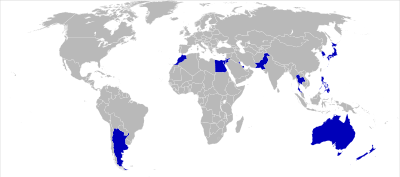- Major non-NATO ally
-
Major non-NATO ally (MNNA) is a designation given by the United States government to close allies who have strategic working relationships with US armed forces but are not members of the North Atlantic Treaty Organization. While the MNNA status does not automatically include a mutual defense pact with the United States, it does confer a variety of military and financial advantages that otherwise are not obtainable by non-NATO countries.
Contents
History
MNNA status was first created in 1989 when section 2350a, otherwise known as the Nunn Amendment, was added to Title 10 (Armed Forces) of the United States Code by Congress.[1] It stipulated that cooperative research and development agreements could be enacted with non-NATO allies by the Secretary of Defense with the concurrence of the Secretary of State. Initial MNNAs were Australia, Egypt, Israel, Japan, and South Korea.
In 1996 major non-NATO allies received additional military and financial benefits when section 2321k was added to Title 22 (Foreign Relations) of the U.S. Code (also known as section 517 of the Foreign Assistance Act of 1961), which added MNNAs to many of the same exemptions from the Arms Export Control Act that were enjoyed by NATO members. It also authorized the President to designate a nation as an MNNA thirty days after notifying Congress.[2] When enacted, the statute designated Australia, Egypt, Israel, Japan, Jordan, New Zealand, and South Korea as major non-NATO allies.
U.S.-New Zealand strategic and military cooperation had suffered a setback after the breakdown of the ANZUS alliance in 1984 because of the Nuclear Ship issue. The designation of New Zealand as an MNNA has increased the collaboration between the two.
After Pakistan was given MNNA status, the US said that it was considering giving the same status to India, and that India could have it if they wanted.[3]
Benefits
Nations named as major non-NATO allies are eligible for the following benefits:
- entry into cooperative research and development projects with the Department of Defense (DoD) on a shared-cost basis
- participation in certain counter-terrorism initiatives
- purchase of depleted uranium anti-tank rounds
- priority delivery of military surplus (ranging from rations to ships)
- possession of War Reserve Stocks of DoD-owned equipment that are kept outside of American military bases
- loans of equipment and materials for cooperative research and development projects and evaluations
- permission to use American financing for the purchase or lease of certain defense equipment
- reciprocal training
- expedited export processing of space technology
- permission for the country's corporations to bid on certain DoD contracts for the repair and maintenance of military equipment outside the United States
List of MNNAs
The following countries have been designated as major non-NATO allies of the United States (in order of their appointment):
Named by George H. W. Bush
 Australia (1989)
Australia (1989) Egypt (1989)
Egypt (1989) Israel (1989)
Israel (1989) Japan (1989)
Japan (1989) South Korea (1989)
South Korea (1989)
Named by Bill Clinton
 Jordan (1996)
Jordan (1996) New Zealand (1997)
New Zealand (1997) Argentina (1998) [4]
Argentina (1998) [4]
Named by George W. Bush
Special cases
 Taiwan - People's Republic of China is recognized as sole official representative.
Taiwan - People's Republic of China is recognized as sole official representative. Panama - Has special defence agreement, but no standing army.
Panama - Has special defence agreement, but no standing army. India - Was offered position.
India - Was offered position.
See also
References
- ^ Title 10, section 2350a of U.S. Code
- ^ Title 22, section 2321k of U.S. Code
- ^ Non-Nato ally: US keen to discuss with India.
- ^ ... represents our recognition of the importance of Argentina's leadership and cooperation in the field of international peacekeeping, notably during Operation Desert Shield/Desert Storm, in Haiti, in its role in supervising the peace between Peru and Ecuador, and in nearly a dozen other international peacekeeping efforts ...
Categories:- Argentina–United States relations
- Bahrain–United States relations
- Jordan–United States relations
- Morocco–United States relations
- Thailand–United States relations
- Philippines–United States relations
- Japan–United States relations
- United States foreign relations legislation
- New Zealand–United States relations
- Australia–United States relations
- Kuwait–United States relations
- Israel–United States relations
- Pakistan–United States relations
- South Korea–United States relations
- 20th-century military alliances
- 21st-century military alliances
- Egypt–United States military relations
Wikimedia Foundation. 2010.

